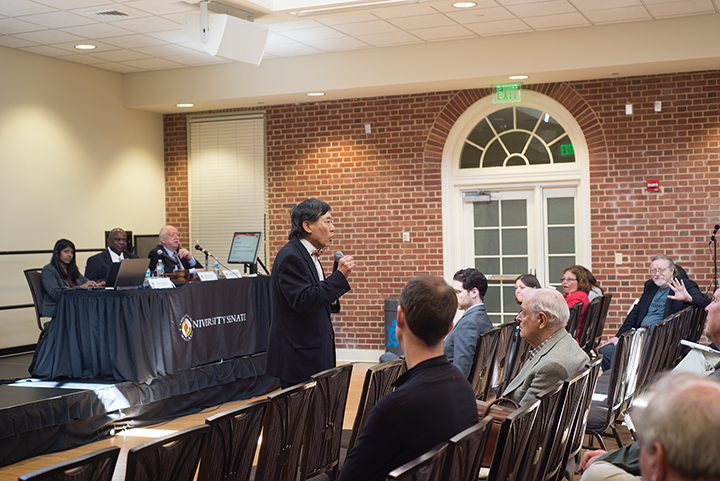The University Senate approved yesterday a new undergraduate public policy major as well as the Undergraduate Policy on the Conduct of Undergraduate Courses and Student Grievance Procedure, which would prevent professors from requiring activities during reading day. It also approved an updated policy and procedures on academic clemency.
The three bills will move forward to University of Maryland President Wallace Loh’s office and, if approved, will then require approval by the University System of Maryland Board of Regents.
Bachelor of Arts in public policy
The new bachelor of arts in public policy, proposed by the public policy school, would be the first of its kind for a university in the Washington metropolitan region and would put this university at a clear advantage, said Robert Orr, the school’s dean.
“This is about much more than just an undergraduate degree,” Orr said. “It will significantly help this university become a top-10 school, expand opportunities and maximize synergies.”
The proposal received widespread support from students, including current Student Government Association President Patrick Ronk and his future successor, Katherine Swanson, who is running uncontested in the upcoming SGA elections.
“I’m originally from Texas, and I came to UMD to be close to D.C. but was disappointed when I found out there was no public policy major offered here,” said Swanson, a junior government and politics major. “This major and our school’s location is the perfect combination to draw many other out-of-state students like myself.”
However, the proposal faced some criticism — mainly from the government and politics and psychology departments — for the program’s lack of interdisciplinary collaboration, specifically the lack of required or recommended courses outside of the public policy school.
“My issue is what kind of public policy major and what kind of relationships we can build along the way,” said Karol Soltan, faculty senator for the government and politics department. “My main hope is that the public policy major that comes out eventually is one that isn’t limited by difficulties of collaboration.”
Public policy school faculty assured the Senate at the meeting today that they would be open to future collaboration, and highlighted that their professors already encompass an interdisciplinary background, including political science, philosophy, economics and physics.
Undergraduate courses and student grievance procedure
The new policies and procedures for undergraduate courses and student grievances updates the policy from its last revision in 1991 under a new name: University of Maryland Policy on the Conduct of Undergraduate Courses and Student Grievance Procedure.
The approved version requires that reading day, the no-class day before final exams, remains a day free from required academic obligation — preventing class meetings or required activities. Only individual meetings and makeup exams may be scheduled at the “explicit request of the student,” the policy stated.
The Educational Affairs Committee opted not to explicitly limit review sessions from being held on reading day after consulting student opinion, committee chairwoman Madlen Simon said.
“The committee recognized that reading day often prevented students from being able to prepare for final exams,” Simon said. “The proposed language attempts to strike a balance.”
Junior bioengineering major Adam Berger, chairman of the Student Affairs Committee, expressed his support for the new changes based on a survey he took of about 30 students.
“The majority of respondents agreed that reading day should be free of all required activities,” Berger said, “but not [limit] review sessions.”
The policy also eliminates a clause that Simon said gave students grounds to present a grievance about lack of time spent on different points of view — for example, creationism in a science course or climate change skepticism in an environmental course.
However, telecommunications engineering graduate student senator Chuck Englehart said this elimination gives professors the opportunity to shut down different ideas, which happened to him as an undergraduate at this university. He was able to use the grievance policy.
“I wouldn’t have had recourse in that situation,” he said.
He proposed an amendment to keep the clause, but it failed.
Policy and procedures on academic clemency
The updates to the clemency policy helps streamline the process for students to get a fresher start on their GPAs after they have not been at the university for five years, said Charles Delwiche, chairman of the Academic Procedures & Standards Committee.
A student can be granted clemency only for up to 16 credits of grades at or below a “D-plus,” but the policy states that those grades will remain on the student’s transcript but will not be factored into the cumulative GPA and will not be used to satisfy degree requirements. The failing grades will remain in the calculation of grades for Latin honors.
“The critical change is that it takes the process away from individual colleges and programs and centralizes it in the office of undergraduate studies,” Delwiche said. “It helps a student who has tried at the university and was not successful [to come back], without getting caught in this trap of GPA.”



